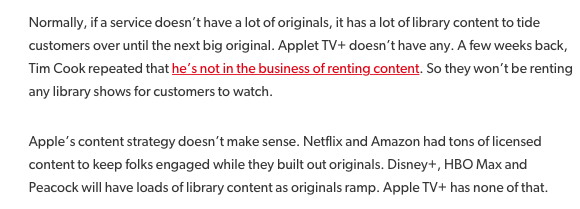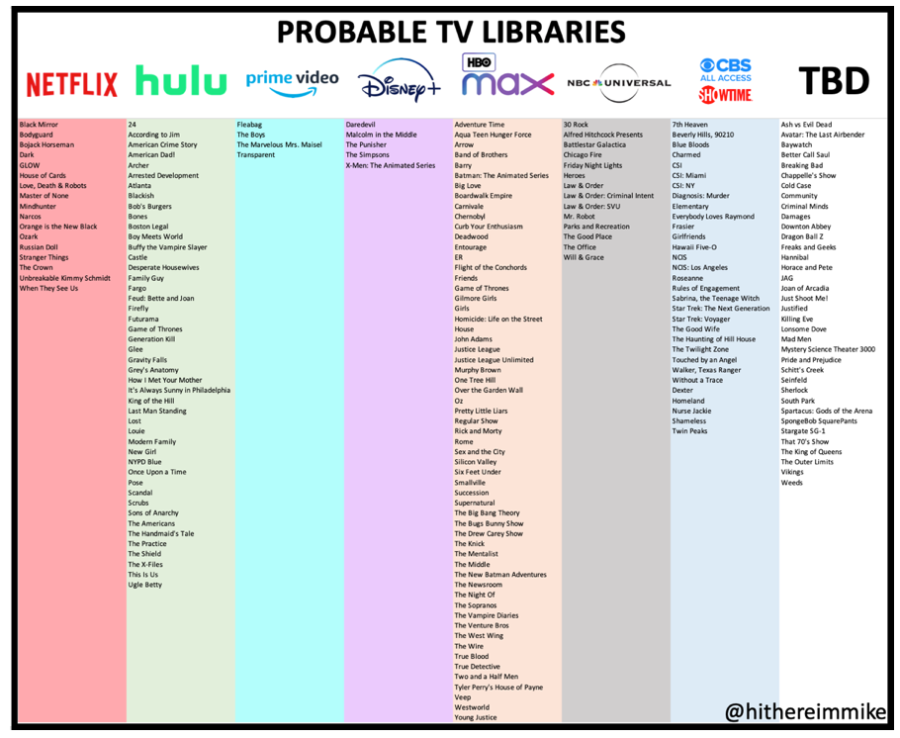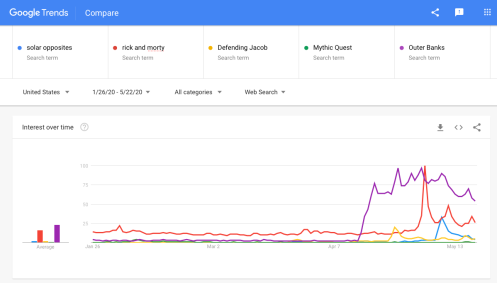Some weeks, you barely have any news to cover. Then, other weeks the deluge comes. Buzzy stories. Executive movement stories. Sneaky scoops. And then Barstool drama.
To help settle the issue, I polled the audience. Everyone wants to talk about Joe Rogan at Spotify. But that’s a $100 million dollar deal. When I look for big moves, I mean big. For new followers, that often means adding up the potential dollar figures involved (and if they’re long term/speculative, discounting them for the cost of entertainment capital, about 8%). So a big streamer potentially dropping billions fits that bill.
If this week’s column has a theme, it’s that many of the biggest moves in entertainment are NOT about adding value for customers. I see that with two big tech titans in particular. That contrasts with a third, Netflix, who is doing right by customers.
This is good for me, since I’m going to praise Netflix repeatedly. I’m a Netflix bear because the stock price makes no sense. Strategically, though, they do a TON right, with a few key mistakes. The world isn’t black and white and neither should be my Netflix coverage. On to the analysis.
Most Important Story of the Week – Apple (Almost) Caves and Buys a Library
I should bust out my Nikki Finke “Toldja” air horn. (Are there new folks to entertainment who don’t get this reference anymore? Showing my age.)
Anyways, my consistent strategic complaint with Apple has been the lack of library content. To just quote myself:
My theory of the case is pretty simple:
It is BANANAS to launch a streaming platform–and charge $10 a month for it–without library content.
It might be unprecedented. We’ve had subscription services launch without original content. (Netflix, Hulu and Prime Video in the early days; some movie platforms too.) But we’ve never had a service launch the opposite way. All originals–and not even that many–but no library? Truly, Apple is zagging while others zig.
Besides the rumored $10 price point, that was dropped to $5/free with purchase, the rest of that column from last August is spot on. Here’s right after they announced the price and most journalists went nuts on the hype:
The counter is that customers value a discount, so a stated price gives it a stated value. Maybe. But the content offering is so sparse—and could be such a dud at launch—that a discount of nothing is still nothing. If you really have no plans to add a library to make this a business that can stand on its own, and it truly is a loss-leading business, just make all the losses explicit and don’t charge for it.
Want another one? Here’s my take in Decider just that last month after Tim Cook told us that for sure they wouldn’t get licensed content:

The news this week out of the Bloomberg leak machine is that Apple is in serious conversations to acquire a licensed content. And maybe a library. (How could Tim Cook lie to us like that back in February? Remember, executives lie ALL THE TIME!)
Apple is finally on the licensed content train. What do we make of this?
M&A May Not Solve This Problem
At least not this year. Most libraries worth owning are locked up in multi-year deals. The time to buy MGM/Sony was in 2016. Then, when they launched Apple TV+, all the licensed content would be ready. Now, if they buy one of those two studios, they either have to buy out all the current licensing deals–which is what Disney+ did–which could skyrocket the costs or they have to wait a few years. Hence, the licensing deals to get whatever is there onto the service quickly.
There is Always a Lot of Content Available, but…
We’re not going to run out of content. That said, the top content is still the top content and more and more of it is locked up into multi-year deals at the soon to launch streamers of Peacock and HBO Max, or Hulu. For a good look, this article by Mike Raab uses a few categories to determine a pretty good list of the top shows of the last few decades.
Apple basically has to pick from the last column on the “Potential Libraries”. And already South Park and Seinfeld are off the list. (For a look at quick value, here’s my article talking about FBOSS top series here.)

Source: Mike Raab on Medium
Does Apple stay prestige and get Mad Men? Broad with That 70s Show? I don’t know, but I doubt it stands up to the potential Hulu, Peacock or HBO Max licensed juggernauts.
Does Licensed Content Matter Compared to Originals?
Yes. This comes up on Twitter. It absolutely matters. I don’t have time to prove it, but trust me.
Apple TV+ Still Doesn’t Solve Any Problems for Customers
I said this was the theme of the week, and I’ll start with Apple. It’s still tough for me to figure out what Apple is really doing that adds value for customers. Especially with Apple TV+. They’ve just launched another streamer that does mostly what every other streamer does. And they’re losing mountains of money simply to seize market share.
Some of you, will offer this I’m sure: But EntStrategyGuy, it’s free!
Remember, offering something free isn’t the same thing as creating value. Instead, it’s capturing value via predatory marketing pricing. It’s the sign of a non-functioning market. (My primer on value creation is here.)
Contrast this to Netflix. When Netflix started streaming, it really was creating value. Library TV was undervalued, so it streamed it on-demand whenever customers wanted. That is a huge value add. Then in 2012, they started losing money to grab market share. But at the start, Netflix clearly solved problems for customers.
Other Contender for Most Important Story – Joe Rogan Moves to Spotify
To understand the importance of Joe Rogan moving to Spotify, I have two analogies, each with a current story. And I’d call it the “malevolent” versus “benevolent” views.
The “Benevolent View” Talent Gets Paid: Joe Rogan to Spotify; “Call Her Daddy” Deal Terms
The analogy for this is Howard Stern in 2005. In that year, he moved to Sirius XM for a whopping $500 million deal that he subsequently renewed.
In a lot of ways, this current story is no different. Spotify is launching a new product, and is signing up top, top talent for it. Rogan is the 2010s Howard Stern. And note the difference: Stern got $100 million per year whereas Joe Rogan got $100 for 3 to 5 years. (It’s unclear the length.) Earlier this year, Spotify paid $250 million for all of Bill Simmons’ company in perpetuity.
That’s what I also see in the other big podcast story of the week, which is the “Call Her Daddy” drama. For those not familiar, the two hosts of a podcast on Barstool called “Call Her Daddy”–Sofia Franklyn and Alexandra Cooper–started negotiating a renewal. It didn’t go well. The shocking part is that the head of Barstool went public with the dispute, revealing deal terms in the process. Some of them are eye popping for podcasts, in the millions of dollars for two podcast hosts. So Barstool is doing well.
All these cases have something in common, which is they show just how much power talent has in entertainment. What Andrew Rosen has been calling the “curse of the mogul” from the book by the same name. In other words, when cash flow is mostly due to specific talent, the benefits flow to that talent who can help you capture them. (It’s worse when the financials are more apparent, like advertising driven content.)
This is the “benevolent” view. Spotify wants to make money from podcasting, so it’s hiring people to get it there. I don’t complain about studios or networks paying for top talent. That happens all the time in the TV industry. HBO wouldn’t pay John Oliver his millions if he show also went up simultaneously on every other channel. Some exclusivity is needed to justify owning channels and producing content in the first place.
But…
The “Malevolent” View
Let’s stick with the radio example, and compare it to the current situation. In the case of top talent for FM/AM radio, all the providers are competing with each other in the same distribution format. So if one radio channel pays it’s top talent more to woo them to its station, they’re simply taking market share from someone else, who can pay likewise.
That’s the Barstool/Call Her Daddy kerfluffle too. In this case, the talent just wants to get paid more. The option, though, is to go to another podcasting service. But they’d still be distributed in all the same places, just taking more of the revenue.
Not so for the Stern example. Sirius XM’s goal wasn’t just to get ear balls on its service, it was to take over radio. (Indeed, it merged with XM in part because they couldn’t replace all terrestrial radio.) They didn’t succeed, but if they had, the goal would have been to use that newfound power to crush suppliers.
Spotify isn’t just trying to get podcasters to help it make money. It wants exclusive podcasts. Why? So that it can take over the podcasting market. And then when it does, it can use that power to crush suppliers. How do you beat the “curse of the mogul”? Be a monopoly. Then talent has no other choice.
Some of you don’t believe me, so I encourage you to read Matt Stoller’s latest newsletter on this. (He’d written about Spotify before.) The example he uses brilliantly is what Google and Facebook did to local news. Before, if you wanted to advertise on The New York Times, you had to pay the Times. Now, you can advertise to NY Times readers when they leave the site. For cheaper.
That’s essentially the Spotify playbook here. (Once I read Stoller’s take, I couldn’t get it out of my head.) Now if you want to advertise to Bill Simmons or Joe Rogan’s audience, you had to do that on their podcast. In the future, Spotify can serve those ads to anyone else when they are listening to something else. Is that good for podcasts individually? Obviously not. You lose your “exclusivity” value when Spotify can sell your customers elsewhere. Ask local newspapers and their massive extinction event how much dynamic advertising via Google/Facebook has helped their businesses.
By the way the New York Times example is very telling. This week they stopped allowing third party data because they know how bad it is for them overall. Owning the data is the key to monetization. Spotify knows that and that’s their goal. Except…
The Reality: Spotify’s Quest to Take Over Podcasting Is Not Guaranteed
If your goal is to become the monopolist of podcasting, getting Simmons and Rogan is a great start.
That said, the theme of the week is customers. What is Spotify doing that helps customers? I keep hearing about “dynamic ad targeting”, but I skip ads all the time. If I can’t skip ads on Spotify, and I can on iTunes, I’ll use iTunes. Especially if only a handful of podcasts are exclusive to Spotify. Meanwhile, will Spotify police ad reads for podcasts that premiere on its platform? How could it even do that?
So the problem is that Spotify isn’t solving for any customer pain points. Maybe their UX is better than iTunes, but it’s worse than many other podcast applications.
Worse, they’ll likely cause pain for their suppliers. Meanwhile, there are enough big media companies that will never go exclusive to Spotify. It just won’t be worth it at one third or less of the audience. So if ESPN, NPR, WNYC, Wondery, etc are all on every other platform, the edge just isn’t there for Spotify. That’s my gut thinking.
(Last point, Luminary is also continuing to prove that subscriptions won’t work for podcasts. It also proves that having a parent in private equity/finance is great at funding news business ventures.)
Other Contenders for Most Important Story
We have more stories. Let’s go quick to wrap things up.
Kevin Mayer Moves to Tik Tok; Rebecca Campbell Takes over Disney Streaming
Say it with me, “We can’t judge executive hires in the moment.”
That doesn’t mean we don’t try. We do all the time. But we’re pretty rough at forecasting executive hit rates.
Still, I want to give a moment of credit to Kevin Mayer and what he can do. His skill set is dealmaking. And that’s what Disney+ needed to launch. Yes, the Mandalorian was a huge hit, and credit to the creative team for that. But Disney+ needed to launch on every potential device. And it did. And Disney needed to claw back rights for all of Star Wars and Marvel and Disney and Pixar movies, which it did! Mayer was the driving force behind these deals.
Will that skill set help at Tik Tok? Maybe. We’ll see what they acquire. It’s an interesting hire for sure.
As for his replacement? I won’t pretend like the coverage in the trades gives me a clue. Campbell has lots of TV and international experience, but not a lot of development experience. I can’t guess either way.
Netflix Is Helping to Cancel Inactive Accounts
Which really is the right thing to do by customers. It can definitely engender good will. And I’ve long praised Netflix for making it very, very easy to cancel.
That said, some credit goes to Wall Street. Every so often, Wall Street decides they like free cash flow negative business propositions with huge growth. Like Netflix. If Comcast could lose $3 billion a year in pursuit of growth, can you imagine what it could build? Same for Disney.
If Wall Street collectively changes its mind that losing money is a bad thing–say when subscriber growth stalls–we may see different behavior at Netflix if it isn’t reward.
M&A – STX mergers with Eros
Since STX launched, their goal has always been global. (This New Yorker read is a case study in a confused business model, which even then talks about getting China money.) In total dollars, this is small, but it reflects who in a global buying market even US studios need global power.
Fake Data of The Week – Datecdotes Spread!
Thanks to Andrew Wallenstein for flagging our latest datecdotes. On Hulu, Solar Opposites is huge! On Apple TV+, Defending Jacob is huge! How big?

Some quick takes on that:
– Damn, Outer Banks is crushing this quarantine in America.
– Sorry, Mythic Quest fans. That show is not. Still.
– Rick and Morty is doing worse than I thought.
– Sure, Solar Opposites is probably doing well. For Hulu. And when I’ve looked at THe Handmaid’s Tale before, it does worse than you’d guess.
– Defending Jacob is probably Apple’s best launch since their premiere, but they have a long road to haul still.

